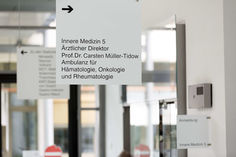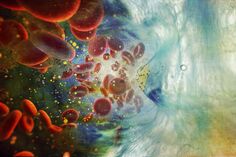
Natürliche Killer-Zellen in der Granulomatose mit Polyangiitis
Natürliche Killer (NK)-Zellen machen ca. 5-20% der Lymphozyten des peripheren Blutes aus und sind damit in etwa so zahlreich wie B- oder CD8+ T-Lymphozyten. Dennoch ist über NK-Zellen deutlich weniger bekannt und insbesondere ihre Rolle in systemisch-entzündlichen Erkrankungen ist kaum untersucht.
NK-Zellen können ohne vorherige Aktivierung und Proliferation und ohne Antigenspezifität andere Körperzellen abtöten (Zytotoxizität). Zudem können sie Zytokine und Chemokine - wie Interferon-gamma oder Tumor-Nekrose-Faktor-alpha - sezernieren, welche regulatorisch auf Nachbarzellen wirken. Die Aktivität von NK-Zellen ist hierbei Resultat der Summe aus aktivierenden und inhibitorischen Signalen der Umgebung. Zielzellen, die inhibitorische Liganden wie MHC-I verlieren (missing self-Hypothese) oder de-novo aktivierende Liganden exprimieren, führen zur gerichteten Degranulation von zytotoxischen Granula aus NK-Zellen. Solche Zielzellen können Tumor- oder viral befallene Zellen sein, aber auch (über-) stimulierte Zellen wie beispielsweise aktivierte CD4+ T-Lymphozyten. Aufgrund ihrer Expression des Fc-Rezeptors CD16 können NK-Zellen auch mit Antikörpern beladene Zellen lysieren. Hierbei spricht man von einer Antikörper-abhängigen Zytotoxizität (ADCC).
Basierend auf diesem Wissen aus der Grundlagenforschung verfolgen wir zwei Haupthypothesen:
- NK-Zellen regulieren überstimulierte Zellen in entzündlich-systemischen Erkrankungen.
- NK-Zell-induzierte ADCC spielt eine Rolle in Autoantikörper-vermittelten Erkrankungen und bei der Behandlung mit Zell-bindenden therapeutischen Antikörpern.
Als Modell-Erkrankung dient uns die Granulomatose mit Polyangiitis (ehemals Morbus Wegener). Die GPA ist eine klassische entzündlich-rheumatische Erkrankung und durch granulomatöse Entzündungen in verschiedensten Organen sowie typische Autoantikörper (anti-Proteinase 3-Antikörper) charakterisiert.
Wir arbeiten in enger Kooperation mit der NK-Zell-Gruppe von Prof. Carsten Watzl (Dortmund), mit Ärzten aus umliegenden Kliniken und dem Pathologischen Institut des Universitätsklinikums Heidelberg. Das Projekt wird durch die Medizinische Fakultät Heidelberg, durch Stiftungsgelder der Universität Heidelberg, durch Spenden und die Eva-Luise-und-Horst-Köhler-Stiftung unterstützt.
Letzte Publikationen
- Merkt W, Bueno M, Mora AL, Lagares D. Senotherapeutics: Targeting senescence in idiopathic pulmonary fibrosis. Semin Cell Dev Biol. 2020 May
- Urlaub D, Zhao S, Blank N, Bergner R, Claus M, Tretter T, Lorenz HM, Watzl C, Merkt W. Activation natural killer cells by rituximab in granulomatosis with polyangiitis. Arthritis Res Ther. 2019 Dec 11
- Merkt W, Lorenz HM, Watzl C. Rituximab and Fcγ receptors in Granulomatosis with polyangiitis (GPA) - comment on the article by Cartin-Ceba et al. Arthritis Rheumatol. 2017 Apr 7. doi: 10.1002/art.40119. [Epub ahead of print] No abstract available. PMID: 28388812
- Merkt W, Lorenz HM, Watzl C. Rituximab induces phenotypical and functional changes of NK cells in a non-malignant experimental setting. Arthritis Res Ther. 2016 Sep 15;18(1):206. doi: 10.1186/s13075-016-1101-3. PubMed PMID: 27629249; PubMed Central PMCID: PMC5024429.
Mitarbeiter
- Dr. med. Wolfgang Merkt, Physician Scientist
- Shuyang Zhao, Doktorandin
Natural killer cells in granulomatosis with polyangiitis
NK cells make up 5-20% of peripheral blood lymphocytes and are thus as numerous as B or CD8+ T lymphocytes. Though, much less is known about NK cells, and their role in systemic inflammatory diseases like GPA has merely been investigated.
NK cells can kill neighbor cells without requiring prior activation or proliferation or antigen specificity. In addition, NK cells produce cytokines and chemokines like interferon-gamma or tumor-necrosis-factor-alpha with regulatory function on neighbor cells. It is commonly agreed that NK cell activation results from the integration of activating and inhibitory signals provided by the environment. Importantly, the degranulation of cytotoxic granula from NK cells is triggered by and restricted to target cells that loose inhibitory MHC-I ligands (missing self) or that express de novo stress-induced activating ligands. Such target cells can be tumor or virally infected cells, but also activated cells like activated CD4+ T lymphocytes. Finally, NK cells can also kill antibody-coated cells, due to the expression of Fc receptor CD16. The latter process is called antibody dependent cell cytotoxicity (ADCC). In this respect, NK cells can be regarded as the extended arm of the adaptive immune system, extending their classical role in innate immunity.
Based on recent knowledge derived from basic research, we follow two major hypotheses:
1. NK cells regulate over-stimulated cells in systemic inflammatory diseases.
2. NK cell-induced ADCC plays a role in autoantibody-mediated diseases and in the treatment with cell-binding therapeutic antibodies.
We use GPA as a model disease to test these hypotheses. GPA is a classical and lethal systemic inflammatory disease characterized by granulomatous inflammation of different organs and autoantibodies targeting proteinase-3. The goal of our work is to better understand beneficial and detrimental contributions of NK cells in these conditions in order to ultimately define pathways that could be therapeutically targeted.
We work in close collaboration with the NK cell group from Professor Carsten Watzl (Dortmund, Germany), surrounding clinics and the Insititute of Pathology of our university clinic. The project is funded by the Medical Faculty Heidelberg, by corporate assets of Heidelberg University, by donations and by the Eva-Luise-and-Horst-Köhler foundation.
Latest publications
- Merkt W, Bueno M, Mora AL, Lagares D. Senotherapeutics: Targeting senescence in idiopathic pulmonary fibrosis. Semin Cell Dev Biol. 2020 May
- Urlaub D, Zhao S, Blank N, Bergner R, Claus M, Tretter T, Lorenz HM, Watzl C, Merkt W. Activation natural killer cells by rituximab in granulomatosis with polyangiitis. Arthritis Res Ther. 2019 Dec 11
- Merkt W, Lorenz HM, Watzl C. Rituximab and Fcγ receptors in Granulomatosis with polyangiitis (GPA) - comment on the article by Cartin-Ceba et al. Arthritis Rheumatol. 2017 Apr 7. doi: 10.1002/art.40119. [Epub ahead of print] No abstract available. PMID: 28388812
- Merkt W, Lorenz HM, Watzl C. Rituximab induces phenotypical and functional changes of NK cells in a non-malignant experimental setting. Arthritis Res Ther. 2016 Sep 15;18(1):206. doi: 10.1186/s13075-016-1101-3. PubMed PMID: 27629249; PubMed Central PMCID: PMC5024429.
Members
- Dr. med. Wolfgang Merkt, Physician Scientist
- Shuyang Zhao, Doktorandin






